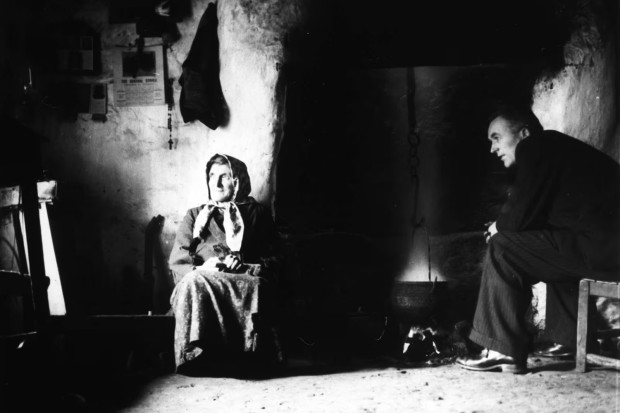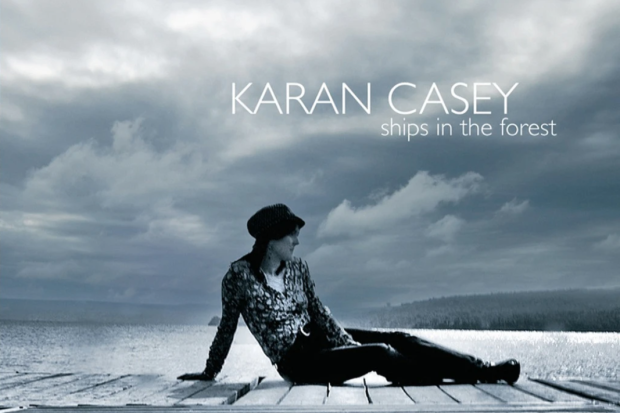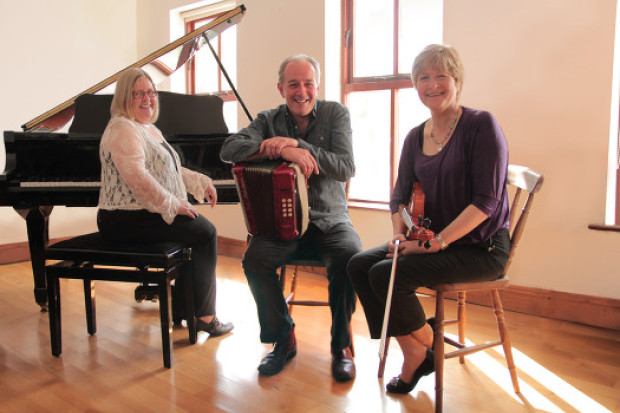
Dermy Diamond, Tara Diamond and Dáithí Sproule
Seanchairde/Old Friends
3-Scones-2008-001
The fiddle-playing of Dermy Diamond is the revelation on this trio recording. Although a familiar figure on the Irish traditional music scene, this is the first recording that carries his name. Spontaneous, inventive, sometimes almost carefree, his busyness in the corners of tunes brings the fiddle to the surface of the music again and again.
Choose any of the five set of reels, ‘Danny O’Donnell’s/The Cedars Of Lebanon/The Milliner’s Daughter’ perhaps, and there is a resistance in Dermy Diamond to letting a note go without trying to present it in a new light. Always searching, using an at times intense bow technique, his versions of tunes, and his approach to variation, remain at a tangent to the familiar.
‘Miss McGuinness/The Stoney Steps’ is probably as succinct an example of the musician’s invention as any. The shortest track on the album at just over two minutes, Diamond drip-feeds in new notes to the melody as it progresses, presenting a case study in how to develop a tune with only the slightess diversion. Interesting to note that he has transposed the first tune from G major to D major, and also adjusted the melody of the second so it complements the first tune better.
Yet it is very much a trio album, and Diamond’s playing is likely all the better for the comfortable group setting of wife Tara on flute and friend Daithí Sproule on guitar. All from Northern Ireland – Dermy, Belfast; Tara, Co. Down; Dáithí, Derry – the style of music on Seanchairde/Old Friends is less regional and more a reflection of thirty years of travel and sessions throughout the traditional music scene in Ireland.
Tara learned her music from her father initially – the flute player Leslie Bingham – while Dermy relied on local musicians in Belfast, Antrim and Down. Their children, Danny and Helen, now also play fiddle.
The impact of Dermy’s playing is accentuated by the relaxed, expressive space that Tara Diamond occupies (in ‘The Boy in The Boat/The Boy in The Gap’ particularly) – leaving spaces dotted throughout the tunes, resting on notes and allowing ornamentation unfurl, almost reviewing a tune before then moving on. Dáithí Sproule is like a wave in the background, at times imperceptible, again allowing Dermy Diamond’s angularity fill in the gaps. Given that Dermy Diamond is also a Professor of Chemical Sciences in Dublin City University, I have to work hard not to use any pun on the quality of the ensemble.
Prompted by a joint concert during the 2007 Frankie Kennedy School, the CD received funding from the Arts Council’s traditional-arts scheme Deis. A barely audible chuckle at the end of the last track hints at the significance of the title.
Published on 1 June 2009
Toner Quinn is Editor of the Journal of Music. His new book, What Ireland Can Teach the World About Music, is available here. Toner will be giving a lecture exploring some of the ideas in the book on Saturday 11 May 2024 at 3pm at Farmleigh House in Dublin. For booking, visit https://bit.ly/3x2yCL8.















